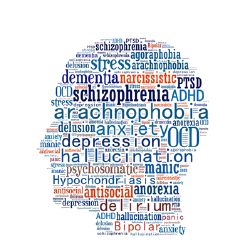Schizophrenia: Symptoms, Treatment, and Hope
Introduction:
Schizophrenia is a complex and frequently misunderstood mental illness that impacts lots and hundreds of humans round the world. It is characterized via capacity of a massive vary of symptoms, alongside with hallucinations, delusions, disorganized thinking, and social withdrawal. These signs can severely affect a person's potential to suppose clearly, manipulate emotions, and have interaction with others. In this complete article, we will delve deep into the world of schizophrenia, exploring its symptoms, handy therapy options, and shedding mild on the manageable for hope and restoration for persons living with this condition.
What is Schizophrenia?
Schizophrenia is a serious and continual mental sickness that typically emerges during late formative years or early adulthood, although it can affect humans of all ages. The condition disrupts the way men and women discover reality and interpret their experiences, main to a distorted view of the world. Schizophrenia is not a split personality disorder, as regularly misconceived, however instead a complex interaction of cognitive, emotional, and behavioral disturbances. There are exclusive subtypes of schizophrenia, each with its special set of signs and symptoms and challenges, making it crucial to apprehend the nuances of the situation to furnish targeted support and intervention.
What are the Symptoms of Schizophrenia?
The signs of schizophrenia can be extensively classified into three groups: positive, negative, and cognitive symptoms. Positive symptoms involve an excess or distortion of ordinary functioning, such as hallucinations (seeing or hearing things that are no longer there) and delusions (holding false, constant beliefs notwithstanding evidence to the contrary). Negative symptoms refer to a reduce or loss of ordinary functioning, leading to social withdrawal, reduced emotional expression, and apathy. Cognitive symptoms impact a person's wondering and reasoning abilities, affecting memory, attention, and problem-solving. Understanding these signs is integral in recognizing the early signs of schizophrenia and in search of well-timed therapy and support.
Can a Person with Schizophrenia Lead a Normal Life?
One common false impression about schizophrenia is that these affected cannot lead normal, pleasing lives. While schizophrenia presents special challenges, with the proper strategy to therapy and support, humans can obtain stability and locate which means and motive in their lives. Effective treatments, including medication, psychotherapy, and psychosocial support, can help control symptoms and enhance normal functioning. Recovery is no longer about eliminating all signs however instead empowering folks to manipulate their situation effectively, boost coping strategies, and reap non-public goals. A multidisciplinary method involving mental health professionals, family, and community assist is essential in promotion restoration and lowering the have an impact on of the ailment on an individual's life.
What are the Warning Signs of Schizophrenia?
Early detection of schizophrenia is vital for early intervention and higher outcomes. Identifying the warning signs of schizophrenia can be challenging, as some signs and symptoms may additionally be subtle or improper for other conditions. However, recognizing adjustments in behavior, thoughts, emotions, and social interactions can be indicative of a viable intellectual fitness issue. Some common warning signs encompass social withdrawal, extended suspicion, modifications in speech patterns, subject concentrating, and adjustments in self-care and personal hygiene. It is quintessential for family members, friends, and educators to be vigilant and supportive, encouraging humans experiencing these signs to searching for expert contrast and assistance.
Is Schizophrenia Curable?
Schizophrenia is a continual condition, which means that it requires ongoing management and support. However, with the proper treatment and support, humans with schizophrenia can ride large upgrades in their signs and ordinary well-being. The intention of treatment is not simply symptom discount but also bettering the individual's excellent of life, fostering independence, and merchandising social integration. Medication, such as antipsychotics, is a common issue of schizophrenia treatment, but psychosocial interventions, inclusive of cognitive-behavioral therapy, family therapy, and supported employment, are additionally critical in facilitating recovery. It is important to understand that every person's journey with schizophrenia is unique, and therapy plans must be tailor-made to meet character wishes and preferences.
What Causes Schizophrenia in the Brain?
The unique cause of schizophrenia stays an location of ongoing research. While no single aspect has been identified as the sole reason of the disorder, a mixture of genetic, environmental, and neurobiological elements possibly contributes to its development. Research suggests that genetic elements play a considerable role, with a greater hazard of schizophrenia amongst people with a family record of the disorder. Additionally, modifications in talent structure, altered neurotransmitter levels, and strange neural connectivity are related with schizophrenia. Environmental factors, such as prenatal complications, early lifestyles stress, and drug use, may additionally additionally make contributions to the risk of creating schizophrenia. Understanding the underlying neurobiological foundation of schizophrenia can lead to more focused and fine therapy tactics in the future.
Conclusion:
Schizophrenia is a complicated and difficult mental disease that influences people and their families profoundly. Early detection, appropriate treatment, and neighborhood guide are indispensable in improving results and advertising recuperation for humans living with schizophrenia. While the ride may have its ups and downs, many men and women can lead significant and gratifying lives with the proper strategy to treatment, self-care, and support. By fostering empathy, reducing stigma, and advancing research, we can work closer to a more inclusive and compassionate society that supports the well-being and attainable of all individuals living with schizophrenia.


:max_bytes(150000):strip_icc()/coping-with-schizophrenia-2953094-f1a9aede88e846879bd37232778ee6ac.png)
:max_bytes(150000):strip_icc()/schizophrenia-age-of-onset-5194845-DD-Final-073c34baac324491b881053833777014.jpg)
:max_bytes(150000):strip_icc()/schizophrenia-treatments-2330662-86632e6754d0472bb5c2891d6eb94bcd.png)

Comments
Post a Comment